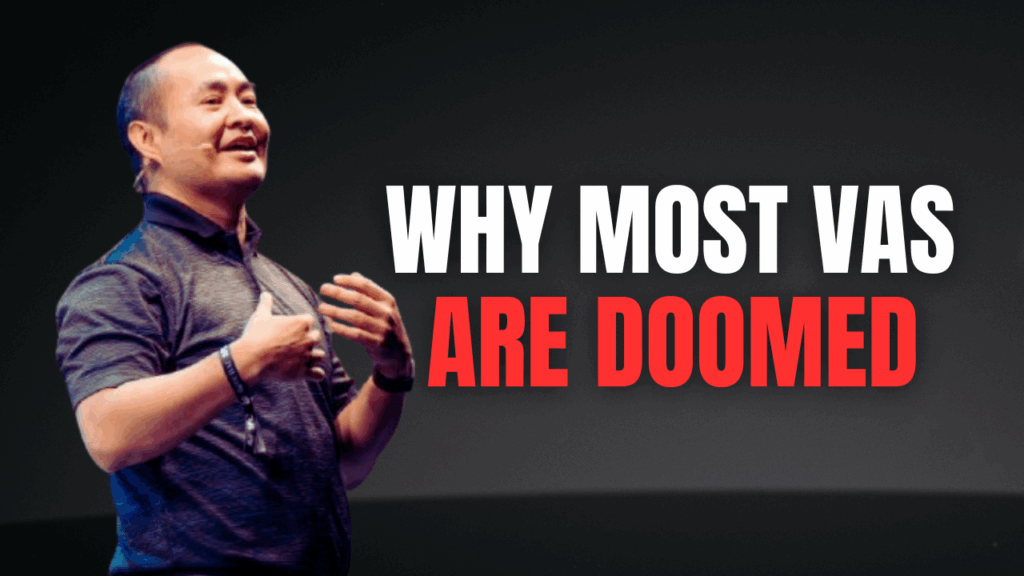
This morning, I told this incredibly talented video editor he would fail trying to work on my content.
Not because of a lack of experience– he had plenty.
Not because he didn’t know the tools– he knew them cold.
He would fail because he didn’t understand the content.
Imagine you’re a Greek language instructor, specializing in advanced conversational Greek. Now imagine someone who doesn’t speak a word of Greek confidently tells you they can produce viral short-form videos about your lessons.
What would your response be?
Understanding GCT is everything
Understanding the Goals, Content, and Targeting (GCT) is what separates high performers from those who make the #1 VA mistake.
Editing without context is vandalism, no matter how “cool” the effects are.
I had a guy message me once: “I will edit your videos.”
I gave him a one-hour raw video, full of everything he needed. But he had no clue what was actually valuable. He added sparkles and jump cuts– but missed the meaning entirely.
He didn’t know the GCT, and therefore, didn’t understand what mattered.
That’s why simply saying “Hire me!” isn’t enough.
If you can’t demonstrate you understand what we do – what our clients do – you’re already behind.
This isn’t just about video editors. This applies across the board: SEO, PPC, social media, web design, course creation– everything.
This is a classic example of why we don’t just hire some random VA. This is why most agencies especially VA placement agencies fail.
Why the VA vs specialist distinction no longer matters
The idea that being a “specialist” or a “VA” defines your capability is obsolete.
Our standards are the same for everyone.
It doesn’t matter what country you’re from or what title you use.
If you know GCT and can execute properly, you’re valuable.
If not, your resume, certifications, and enthusiasm don’t matter.
Today, we are all content managers– smart humans managing armies of virtual agents (VVAs) and AI tools.
Your ability to orchestrate and curate is the skill that matters.
AI is already better at mechanical tasks
AI tools like Opus.pro can cut long-form video into engaging short clips for just $9.50 a month.
In fact, they’re already outperforming most editors because unlike humans who “guess,” AI is programmed to follow the signal.
But AI alone isn’t enough.
It needs human curation by someone who actually understands what’s being said and why it matters.
When someone grasps the GCT, they can use AI tools with intention and get the job done 100x faster.
The real job: repurposing strategy, not inventing noise
Digital marketing is about strategic amplification.
An SEO expert who doesn’t understand a business’ goals, content, and targeting will fail even with 10 years of “experience.”
Same goes for social media managers, email marketers, and anyone else calling themselves an “expert.”
If you’re working with a local plumber, you don’t need to reinvent the wheel.
Marketing a plumber in Orange County is almost identical to marketing one in Dallas or Chicago.
But the raw ingredients (the plumber’s reviews, testimonials, and photos) must come from that business.
Your job is to repurpose those elements into powerful, trust-driven content and then boost it using every available channel.
But if you don’t understand the business, no AI tool or editing trick can save you.
Why “tool proficiency” is not a strategy
Today, marketing is overrun with enthusiastic tool experts.
They know how to cut a reel, launch a campaign, or generate content with ChatGPT.
But without GCT, they cause more damage than good.
And they’re confidently wrong.
That’s why we continue to see waste, hype, and missed opportunity.
The core of our system, the 4-phase Content Factory, is built on understanding GCT, then repurposing what’s already working.
We don’t need help with “content creation.”
We need help processing raw content in a way that maintains strategic clarity.
When we say “strategy,” we don’t mean a slide deck.
We mean listening to the client, understanding their world, and aligning execution to amplify what’s already working.
So before you pick up another tool, ask yourself:
How well do I understand what this person is really trying to say?
Do I know their goals? Their voice? Their audience?
That’s the difference between someone who is doomed and someone who is indispensable.